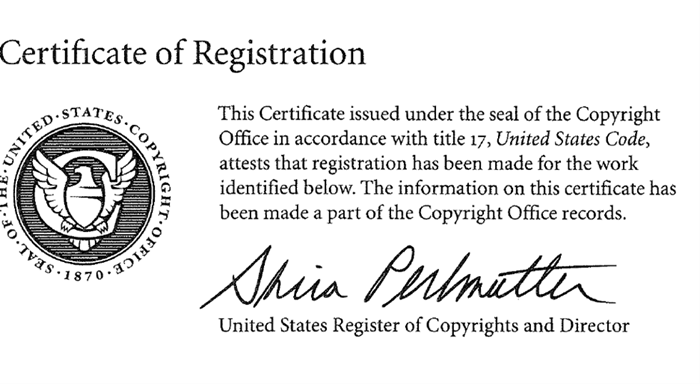You might be surprised to receive a Certificate of Copyright Registration with no signature. Here is what is happening and some potential uncertainty surrounding these certificates.
As you may have read in the news, the Register of the U.S. Copyright Office, Shira Perlmutter, was notified on May 10, 2025 that her “position as Register of Copyrights and Director at the U.S. Copyright Office was terminated effective immediately.” Perlmutter filed suit, and the action is pending.
Lately the U.S. Copyright Office has been issuing certificates of registration without a signature from the Register of Copyrights. There are typically two key items on any Certificate of Registration, as shown below: (1) the Seal of the Copyright Office and (2) the signature of the Register of Copyrights.

It bears noting that 17 U.S.C. Section 410 (a) states: “ When, after examination, the Register of Copyrights determines that, in accordance with the provisions of this title, the material deposited constitutes copyrightable subject matter and that the other legal and formal requirements of this title have been met, the Register shall register the claim and issue to the applicant a certificate of registration under the seal of the Copyright Office” (emphasis added). Nonetheless, in a reported effort to continue the important work of issuing certificates of registration, the U.S. Copyright Office recently has been issuing Certificates of Registration with the U.S Copyright Office seal, but without the signature of the Register of Copyrights.
As you may know, in order to file a copyright action in federal court, one must have a Certificate of Copyright Registration. These unsigned Certificates of Registration are raising questions as to whether they might be challenged in the future when a litigant relies on them, because they lack the signature of the Register. At the same time, a company is eligible for statutory damages and attorney’s fees only if it applies to register its work prior to infringement occurring, or within the 90-day grace period from initial publication, so a wait and see approach is also risky.
As of this writing, it remains to be seen whether there will be challenges to these certificates or whether the U.S. Copyright Office will later decide to reissue them or otherwise address these questions.
We will be watching these issues unfold. In the meantime, please contact the author if you would like assistance with navigating these issues.